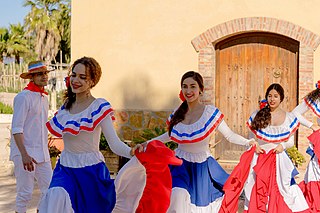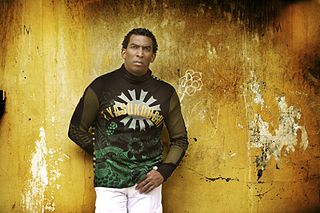Related Research Articles
Latin hip hop is hip hop music that is recorded by artists in the United States of Hispanic and Latino descent, along with Spanish-speaking countries in the Caribbean, North America, Central America, South America, and Spain.
West Coast hip hop is a regional genre of hip hop music that encompasses any artists or music that originated in the West Coast of the United States. West Coast hip hop began to dominate from a radio play and sales standpoint during the early to-mid 1990s with the birth of G-funk and the emergence of record labels such as Suge Knight and Dr. Dre's Death Row Records, Ice Cube's Lench Mob Records, the continued success of Eazy-E's Ruthless Records, Dr. Dre's Aftermath Entertainment, and others.

The music of the Dominican Republic is primarily influenced by Western European music, with Sub-Saharan African and native Taino influences. The Dominican Republic is mainly known for its merengue and bachata music, both of which are the most famous styles of music in the Dominican Republic, and have been exported and popularized around the world.

The Music of Puerto Rico has evolved as a heterogeneous and dynamic product of diverse cultural resources. The most conspicuous musical sources of Puerto Rico have primarily included African, Taino Indigenous, and European influences. Puerto Rican music culture today comprises a wide and rich variety of genres, ranging from essentially native genres such as bomba, jíbaro, seis, danza, and plena to more recent hybrid genres such as salsa, Latin trap and reggaeton. Broadly conceived, the realm of "Puerto Rican music" should naturally comprise the music culture of the millions of people of Puerto Rican descent who have lived in the United States, especially in New York City. Their music, from salsa to the boleros of Rafael Hernández, cannot be separated from the music culture of Puerto Rico itself.
Urban contemporary music, also known as urban music, hip hop, urban pop, or just simply urban, is a music radio format. The term was coined by New York radio DJ Frankie Crocker in the early to mid-1970s as a synonym for Black music. Urban contemporary radio stations feature a playlist made up entirely of Black genres such as R&B, pop-rap, quiet storm, urban adult contemporary, hip hop, Latin music such as Latin pop, Chicano R&B and Chicano rap, and Caribbean music such as reggae and soca. Urban contemporary was developed through the characteristics of genres such as R&B and soul.
Bachatón is a fusion genre of reggaeton from Panama and Puerto Rico as well as bachata from the Dominican Republic. Bachaton combines bachata melodies and reggaeton style beats, lyrics, rapping, and disc jockeying. The word "bachatón" is a portmanteau of "bachata" and "reggaeton". "Bachatón" was coined and widely accepted in 2005. It is a subgenre of reggaeton and bachata.

Political hip hop is a subgenre of hip hop music that emerged in the 1980s as a form of political expression and activism. It typically addresses sociopolitical issues through lyrics, aiming to inspire action, promote social change, or convey specific political viewpoints. The genre draws inspiration from earlier politically conscious artists, such as The Last Poets and Gil Scott-Heron, as well as movements like the Black Power movement and the Black Panther Party from the 1960s and 1970s.
European hip hop refers to hip hop music and culture originating from Europe. Emerging in the 1980s following the genre's popularity in the United States, European hip hop has evolved into a diverse and influential musical movement. It encompasses a wide range of styles and subgenres, reflecting the continent's varied cultural landscapes and the experiences of both ethnic nationals and immigrant communities. Notable regional scenes include British hip hop and grime, German hip hop featuring both ethnic German and Turkish artists, and French hip hop, which has undergone several distinct eras of development. Other countries such as the Netherlands, Italy, Poland, and Romania have also produced significant hip hop scenes, each with its own unique characteristics and prominent artists.

Fulanito is an American musical group based in Washington Heights in New York City. The group combines traditional merengue with elements of other genres such as house, hip hop, and bachata among others. With over five million albums sold throughout the world, they were at one time the top selling act in Colombia, and were placed on other charts including those of Japan, Switzerland, United States, and Chile. Their name means "Little John Doe" in Spanish. Members of Fulanito had previously been in popular groups such as 740 Boyz and 2 in a Room.

Pedro René Peralta Soto, better known as Chichi Peralta, is a Dominican musician, songwriter, composer and producer.
The Gambian hip hop scene is a relatively new scene in African hip hop which developed in the mid-1990s and was heavily influenced by American hip hop and Senegalese hip hop. Gambian hip-hop has been heavily influenced by international music scene including worldbeat, Senegalese wolof music, and American hip hop, as well as traditional Gambian mbalax and n'daga music. Dominican merengue and Jamaican reggae, ragga, and dancehall have also influenced the development of Gambian hip-hop.
Hip hop or hip-hop, formerly known as disco rap, is a genre of popular music that originated in the early 1970s from the African American community. Hip-hop music originated as an anti-drug and anti-violence genre consisting of stylized rhythmic music that often accompanies rapping, a rhythmic delivery of poetic speech. In the early 1990s, a professor of African American studies at Temple University said, "Hip-hop is something that blacks can unequivocally claim as their own." By the 21st century, the field of rappers had diversified by both race and gender. The music developed as part of the broader hip-hop culture, a subculture defined by four key stylistic elements: MCing/rapping, DJing/scratching with turntables, breakdancing, and graffiti art. While often used to refer solely to rapping and rap music, "hip hop" more properly denotes the practice of the entire subculture. The term hip hop music is sometimes used synonymously with the term rap music, though rapping is not a required component of hip hop music; the genre may also incorporate other elements of the culture, including DJing, turntablism, scratching, beatboxing, and instrumental tracks.
Merenhouse, merenrap or electronic merengue,Mambo o Mambo de Calle is a style of Dominican merengue music formed by blending with dancehall reggae and hip hop. The mix of Latin music, house music and dancehall started in NYC in the late 1980s.
Vicente García Guillén is a Dominican musician, singer and composer. He is the former lead singer of the Dominican alternative rock band Calor Urbano, which he left in 2010 to pursue a solo career. Garcia has collaborated in concerts with renowned artists such as Juan Luis Guerra, Alejandro Sanz, Cultura Profetica, Juanes, Ximena Sariñana and Maná among others. He has won four Latin Grammy awards including Best New Artist in 2017.

Gabriel Alberto Azucena, who goes by the stage name GAWVI, is an American Christian hip hop artist and music producer, formerly for Reach Records. Born in the Bronx, New York, he has released three extended plays, five albums, and twenty-three singles including his songs; "In the Water" and "Late Nights."
Jacques "Haitian Jack" Agnant is a Haitian-born music executive and promoter in the rap music industry. He has worked with several popular artists including Tupac Shakur, The Notorious B.I.G., Justin Rose, and Wyclef Jean. In 2007, he was deported from the United States.
Urbano music or Latin urban is a transnational umbrella category including many different genres and styles. As an umbrella term it includes a wide and diverse set of genres and styles such as dancehall, dembow, urban champeta, funk carioca, Latin hip hop and reggaeton. The commercial breakthrough of this music took place in 2017 with artists from Colombia, Cuba, the Dominican Republic, Panama, Puerto Rico, the United States, Venezuela and even non-Spanish-speaking nations, such as Brazil, where Portuguese is spoken.
Juan Miguel Villar, known as Tali Goya, or simply Goya is a Dominican Republic Latin trap rapper raised in New York City. He was influenced by artist such as Jay-Z, Eminem and 50 Cent, as well as gangsta rap.
References
- ↑ Tuider, Katherine; Caplan, Evan (2012). Dominican Republic (Other Places Travel Guide). Other Places. ISBN 978-1-935850-09-0.